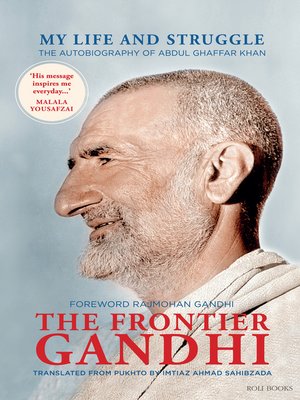The Frontier Gandhi
ebook ∣ My Life and Struggle: The Autobiography of Abdul Ghaffar Khan
By Imtiaz Ahmad Sahibzada

Sign up to save your library
With an OverDrive account, you can save your favorite libraries for at-a-glance information about availability. Find out more about OverDrive accounts.
Find this title in Libby, the library reading app by OverDrive.



Search for a digital library with this title
Title found at these libraries:
| Library Name | Distance |
|---|---|
| Loading... |
Born in 1936, Imtiaz Ahmad Sahibzada, joined the erstwhile Civil Service of Pakistan in 1959. After serving in a number of assignments in the Provincial bureaucracy of the province of Khyber Pakhtunkhwa, which included that of the Chief Secretary, he was transferred to Islamabad in 1987. There he served as Secretary to the Federal Government in different ministries and superannuated in 1996 as the Cabinet Secretary. Thereafter, he went on to become a member of the Federal Public Service Commission, a member of the National Security Council, Chairman of the Federal Lands Commission, Wafaqi Mohtasib (Ombudsman) of Pakistan and Advisor to the Prime Minister on Tribal Affairs. He finally retired from public service in 2008. He is the author of the Pilgrim of Beauty and A Breath of Fresh Air. The former contains translations into English of selected poems of the famous Pukhtun poet, Ghani Khan, who was Ghaffar Khan's son. The latter is a compilation of the speeches and interventions of Ghani Khan in the Central Legislative Assembly of India, 1946. Imtiaz Ahmad had a close friendship with Abdul Ghani Khan, who is the greatest Pukhtun poet of the century, was an artist and also a Member of the Indian Legislative Assembly in 1946–47. He first met him in 1947–48 and remained closely associated with him until his death in 1996.|Affectionately known as 'Bacha' Khan or 'Badshah' Khan amongst his people, Khan Abdul Ghaffar's life was dedicated to the social reform of the Pukhtuns, who traditionally adhere to a strict code of life called 'Pukhtunwali', which is governed by rather rigid tribal norms. Bacha Khan is an acknowledged leader in the hearts of the Pukhtuns across the world, due to his life long struggle to modernize Pukhtun society and his teachings of non-violence, adopted by his Khudai Khidmatgar (Servants of God) party, during the struggle for independence against the British. He stands tall in the pantheon of leaders of the movement for independence. A close associate of Mahatma Gandhi, his success in mobilizing the Pukhtuns of the North-West Frontier Province and the Tribal Areas through a non-violent struggle, had significant bearing on this movement, in which the Khudai Khidmatgar allied with the Indian National Congress. Few are aware that, during the struggle for independence, the Khudai Khidmatgar lost the most number of workers, compared to any other party that was part of this movement, under a tyrannical suppression by British colonialists. An increasing consciousness amongst the Pukhtuns against oppression and war, in Pakistan and Afghanistan, has led to a resurgence of the teachings of Bacha Khan. His powerful political weapon of non-violence, his emphasis on including women in all walks of life, his belief in religious tolerance and pluralism, are, today, values that bear increasing relevance to the people of a much-troubled region. The Pushto edition of Bacha Khan's autobiography was first published in 1983 in Afghanistan, when he was 93 years old. Nearly four decades later the book has been translated and published for the first time in English. (An earlier account of his life, also titled My Life and Struggle was published in 1963 but this was based on interviews conducted with him and not his written autobiography.) This translation was painstakingly done by Sahibzada at the request of Shandana Humayun Khan, to whom he has dedicated the book. Shandana's maternal great-grandfather was Qazi Ataullah, a close lieutenant of Bacha Khan's and a key figure in the Khudai Khidmatgar movement. Before the translation process started, Sahibzada and Shandana visited several members of Bacha Khan's family including his grandsons Nasir Ali Khan, Asfandayar Wali...







